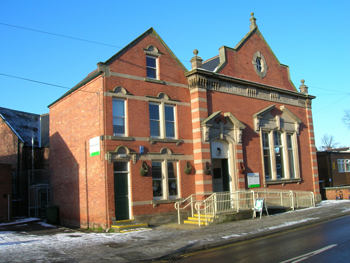
Reading & Libraries
120 Years of Carlton Library with Bob Massey
Celebrate 120 years of Carlton Library at this informative and engaging talk by local historian Bob…
Our new course booking system is live!
Visit our new Learner Hub
to create your account, where you can book and browse all our adult learning courses.
Andrew Graves is our Lost Words poet 2021 -2022. As part of the project, he worked with children and young people at schools across Nottinghamshire to help them write poetry inspired by local dialect - past and present - some of the results of which you can see in this virtual exhibition and in libraries during the exhibition tour.
Nottingham born and bred, Andrew regularly performs his work throughout the UK and is often cited as the hardest working poet in the East Midlands. He has appeared on TV and radio on a number of occasions being featured on 6 Music’s Cerys Mathews Show, Inside Out and the documentary Evidently John Cooper Clarke. His first full collection Light at the end of the Tenner, was published in 2014 and his latest titles include Not Dancing with Ingrid Pitt (Burning Eye Books 2020), God Save the Teen (Burning Eye Books 2017) and Welcome to the Cheap Seats, a history of working class cinema (Five Leaves Publications 2019). He has performed with the likes of Sleaford Mods, John Hegley and Henry Normal and has been commissioned by the National Portrait Gallery, BBC Radio 4, Edinburgh International Literature Festival and has recently represented the East Midlands for National Poetry Day.
He has over fifteen years experience as a workshop leader and facilitator.
During 2022 Andrew will be leading Lost Words dialect poetry workshops for adults at each of the library touring venues. Find out more and book your place.
Presenting Traps - a specially commissioned dialect poem for Nottinghamshire's Lost Words by Andrew Graves:
Traps
by Andrew Graves
Rain always reminds me of
school back then,where sometimes it felt that
no soonerhad we learned to stand up,
say ey up,they were telling us
to shut our traps and sit
down.Best opportunities already
slammed shut,as though the world had put
the wood in’t hole for good.
So, we used to wag it.
Finding shelterfrom the crowd,
cadged fags in our gobs,
shivering nesh on them rawky November
afternoonslike Halloween hangovers,
our mard-arse faces twisted
like the turnips we used to
carveto blag tuffees from folks on
that posh bit of street.
Clammed to death, stomachs as
emptyas a snaptin, done in, waiting
to get called in for tea,for chip cobs, vinegary
heaven on a plate.
Convinced we were destined to
get caught in their plans,we were always hoping for weather
and times less rammel,like the Summers we had when
we were toddy,the cowlady blitz of ’76,
nicking guzgogs from owd Baxter’s
backyard.
Chasing after the oakie man,
gagging for a sucker,
day trips to Skeggy,
paddling in the nuddy by the
broken glass
Then back home to that
greasy, tomato sauce forgotten estatewhere grommars stood nebbin’
throughpristine net curtains
and rag and bone bobos
clopped past jitties and corsies,
and kids in parkas worn as
Batman capes.
Those Steptoe realities of
unfurling beauty, ruffling the edgesof what they thought that we
wereand said we weren’t.
They called us kitchen sink,
broken and irrelevant,quick to write us off,
without even checking if we had words too.Not needing their permission
we bled into the language,
soaking into the missed
cornersof a county that was always
ours.
They may try to throw us off
But we can always put the
kettle on
and though it may be silin’
downon this unapologetic little
townwhere it’s always a bit black
over Bill’s mam’s house
we can still get mashin’
keeping our lugholes open
but never our traps shut
“Being a Nottingham-based writer means I can’t help but be fascinated by accents and dialects, as the county as a whole contains so many variations of both. Like other areas, Nottingham and its surrounding towns and villages, is awash with a verbal history. Many words which are either still in use or have been forgotten, tell us who we are and describe our links to industry, environment and locality. Having been involved with the Lost Words project, mainly in schools, I have been delighted to see the enthusiasm shown by young people for slang and local phrases, both old and new. I feel really honored to now be taking this project out to adults and the wider community in the form of creative writing workshops in Inspire libraries."